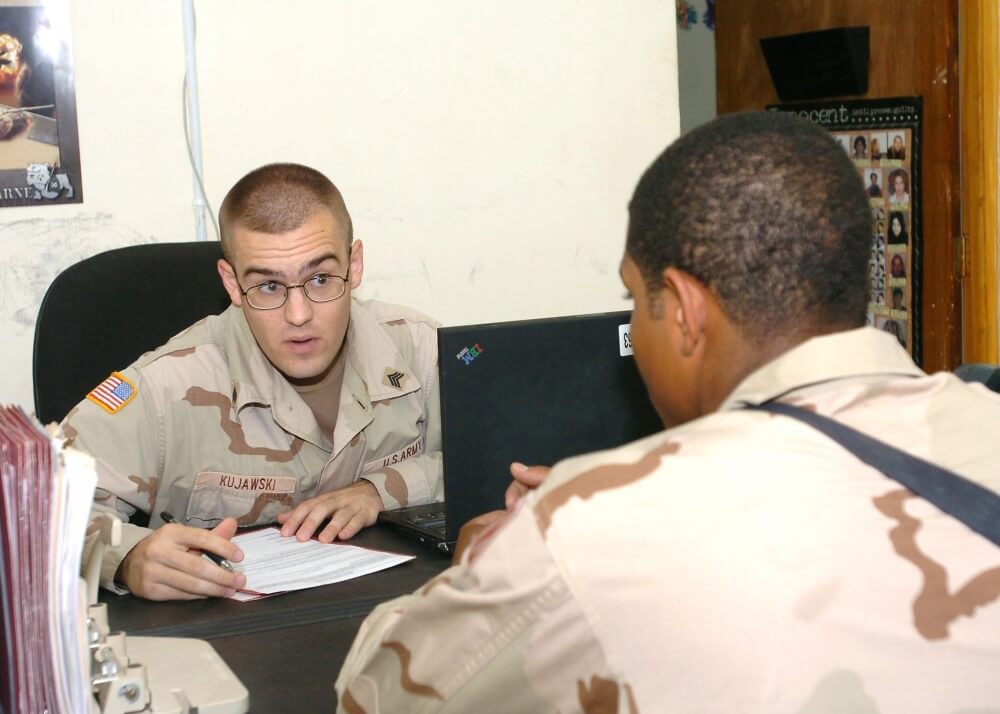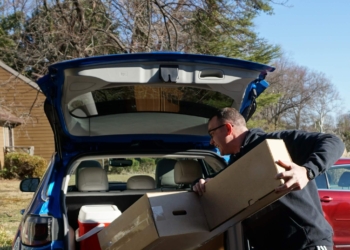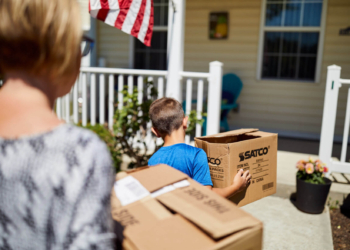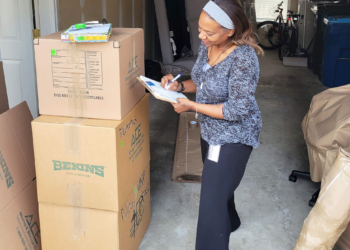So, it is your first time moving with the military. Or maybe it is your third, or tenth time, relocating the contents of your entire house to a new place called home.
During our first PCS, I felt completely overwhelmed by the details and logistics. I was a new military spouse, a new mama and traveling to a new home that transferred us nearly 3,000 miles from our family support system. I had no clue what I was doing, but I somehow managed to complete that move (and the next two) and keep my sanity intact.
Here are some packing and organization tips that helped make the transition easier, plus a few tricks that I learned for the next time.

Part 1: Before the move and pack out.
A new duty station is in your future. It’s exciting and overwhelming. Here are a few tips to get you started.
- Triple check your orders.
On the first copy of orders, my name was spelled incorrectly. On the second, they listed my husband’s birthdate inaccurately. By the third error – yes, there was a third – I was anxiously awaiting revised copies. Fortunately, after much persistence, the correctly amended document arrived just in time. Without accurate orders, you cannot move forward with scheduling everything needed to relocate – make sure you triple check the details. - Obtain Power of Attorney.
Power of Attorney (POA) is an excellent document to have on hand for many situations. It is helpful to obtain one before your PCS, so you can sign forms in lieu of your spouse. Even if they are scheduled to be home for the move, we all know last minute things happen, and plans often change. It is one less stressor to be able to continue your move without worrying if your service member will be home while the packers load up your household goods (HHG). - Purge, purge, purge.
Moving is an excellent reason to sort through that old box of clothes in your closet, organize a garage sale, recycle that miscellaneous Tupperware and donate items you no longer use. Purging through the excess also removes unnecessary items from your total weight allowance. - Have a PCS binder and checklist.
There are so many great organizational packets and binders available to choose from to help make your PCS transition as smooth as possible. I created my own binder with relevant checklists, important documents, information, travel and hotel itineraries, budget, utility bill tracker and vehicle shipment papers. - Set aside pro gear.
A separate weight allowance is provided for job-specific items and tools during an official military move. This includes equipment, papers, books, field gear, reference materials and tools of up to 2,000 pounds for the service member. An additional 500-pound gear limit is available for spouses too. - If it is irreplaceable, keep it with you.
Birth certificates, marriage certificates, passports, medical records, sentimental jewelry and photos, and any other details of importance stay with me in my carry-on suitcase. If it cannot be easily replaced, it stays on my person during the move. - Inspection walk through.
TSP (Transportation Service Provider), or your carrier, is responsible for conduction a pre-move inspection survey of your entire home. This allows them to estimate the total weight of goods, determine the number of rooms to pack and crates needed, note any issues, and confirm your pick-up day and time. Ensure the reviewer prepares an accurate appraisal, double-check you reveal any hidden storage compartments or closets, and ask any questions you may have before moving day. - Record an inventory video.
Pictures are worth a thousand words, but a video can provide additional protection in the case of damages or missing items. Before the movers come, take a walk-through video of your entire home, including opening drawers and cabinets, to have on hand to dispute any challenges. - Take décor off the walls.
The movers are not responsible for removing any items hanging on the walls – this includes curtain rods, mirror, picture frames, hardware, decorative items and storage racks. Taking these things down yourself also allows you to organize them by room before the packers arrive. - Unplug everything.
Movers are not required to unplug your appliances and electronics. They may, however, charge you extra to complete this task. Make sure you disconnect all plugs from the wall outlets before the packers arrive, defrost and drain major appliances, such as refrigerators and washing machines, and take down any window air conditioning units.
Part 2: The move itself.
The day has come, and it’s time to get the move started. It’s easy to forget things in the chaos of the day. Here are my tips for the day of to keep you on track.
- Record your serial numbers and keep an inventory list.
There will be a separate inventory sheet provided for high value items. Make sure to record the serial numbers of your electronic devices, smaller valuable items and other important equipment. Keep a copy for your records available in case any discrepancies arise. - Keep your drawers organized.
Empty kitchen drawers into gallon bags or large containers before the packers arrive. This keeps everything organized by drawer together, making unloading a breeze. It also ensures the utensils stay clean and free of debris. - Sheets and curtains in storage bins.
Wash and dry sheets, curtains, bedding and shower liners and then store them in clear plastic storage bins. The movers will usually load the entire container into a large moving box, and your items will stay clean and fresh for immediate use at your next destination. For extra freshness, I will also include a dryer sheet or satchel of dried lavender in the tote. - Pay for the extra insurance.
Upgraded insurance will be an option provided by TMO. They will most likely tell you that you do not need it, because the military will pay for any damages. But there are some circumstances and perils – or unforeseen events – where this may not apply. For us, the additional peace of mind, and greater care by the moving company packing your belongings, is well worth it. - Add copies of your orders to every box.
Hopefully, all your boxes arrive at your new home as planned. If a box does disappear or end up en route to an alternative destination, a copy of the orders in the box will easily capture where those goods should be forwarded. - Have someone watch your kids.
Packing up your entire home is a big project. Having a trusted neighbor or friend hang out with your kids for a few hours after the movers arrive can alleviate some stress. As another alternative, some military branches will also pay for up for 20 hours of care per child during an official change of station move. - Organize and label your belongings by category.
Use color coded stickers or markers to label your boxes by room (ex: green = living room, yellow = bathroom, etc.). To make things even quicker to find, add the sub-category (ex: baby clothes) so you know exactly what is in each carton without having to dig through every box for that room. - Inspect the items your movers mark as damaged before you sign the inventory sheet.
Make sure to go over the inventory sheet with your moving company, and double check every item marked as damaged before you sign the inventory sheet to ensure you agree with the labeled condition. Sometimes, people just sign the inventory sheet without cross referencing the notes of damage, which can result in surprises while unpacking - Research your new station.
Maybe you have a few months before your move (or maybe just a few weeks!) but researching your new local area is advantageous. Schools, neighborhood, amenities, living on base vs. off base, area parks and attractions and specific stores in the region are some of the beneficial things to learn about before arriving at your new home. - Save money.
PSC moves are expensive, and those costs can add up quickly. Often, you have a government travel charge card to absorb the expenses of your move. In our case, we were not authorized to use the card for our move. Instead, we needed to pay costs out of pocket and get reimbursed later (make sure you keep all the receipts to submit!). Saving money is crucial for unexpected events too.
Related: PCSing during a pandemic.

Part 3: Last details before you head to your new duty station.
This is the last few hours before you get on the road or ready to get on that plane to head OCONUS. Here are a few things to think about when in the final stages of your PCS.
- Expect the unexpected.
We had an unfortunate situation during our PCS to Hawaii. Our home credit union cancelled every single one of our debit cards due to a suspected data breach and sent the new cards to the residence we had just moved away from. We only found out the day after we arrived in Hawaii, when all our cards were continuously declined. This was even more ill-fated because we happened to be visiting our families in our home state right before our official move for a few weeks, and could have walked into the bank anytime then if we’d known (they sent the notice letter to our old address via snail mail, the same day we moved out). I am glad we had a credit card for emergencies because I have no idea what we would have done without one, stuck in a hotel and ordering lots of takeout, while waiting for our new debit cards. - Pack a survival kit.
A “first week” box of essential items like toilet paper, a shower curtain, hand soap, non-perishable snacks, sheets, and pillows greatly eases the transition to a new home. I try to make sure this box is loaded last, so it is unloaded first. - Take out the trash.
It is well documented that everything will get packed – including trash cans that still have trash in them. Make extra sure your cans are empty before the movers start loading up your belongings! - Keep anything you do not want packed in your car.
After hearing multiple stories from friends about the “do not pack” room being ignored or missed, and important documents accidentally being sent packed on a truck, I decided leaving those important items in the car was our best bet. This leaves zero room for confusion about whether it should be packed by the movers. - Double check the cabinets and drawers.
No matter the size of your home, it is easy for little things to get missed or stuck in cabinets and drawers. After the packers drove off into the sunset with our completed boxes, we realized there were several small things that should have been on the truck that were still in the back room. Some friends of ours once accidentally left valuable china from their wedding in a cabinet, and the new tenants unfortunately claimed they never saw the items. Make sure to triple check all your storage spaces! - Keep hardware with you.
Some people prefer to tape hardware to the furniture piece it belongs to, or to throw all the nuts and bolts in one master box on the truck. After trying both methods, losing things both times, and several runs to the hardware store in our new town, I discovered that I prefer to keep small assembly parts for important items labeled in our carry-on bags when possible. - Do not hesitate to ask the movers to repack something.
If you notice that your china is not being wrapped effectively, or an item like a mirror is scratched during packing, do not hesitate to speak up and ask the movers to repack the items. If any damage occurs while the movers are loading your household goods, be sure the item condition and detail is marked accurately on the inventory sheet. - File any claim damages within four weeks.
Theoretically, you have 75 days. And hopefully, you do not have any substantial damages, but we all know they happen sometimes. The sooner you file, the better your memory for the details – and the quicker your reimbursement check arrives to replace your items. - Take a L.I.N.K.S. class.
Whether it is your first move or your tenth, a L.I.N.K.S. class can be incredibly helpful in providing information about your new duty station, local attractions, discounts, maps, base amenities and general support. It can also be a great introduction to some new friends. - Just breathe.
Take a minute for yourself in between the hecticness of relocating – get a pedicure, take a nature walk – whatever helps you destress best. We can often be overwhelmed and constantly focused on moving but taking a little time to relax is an important part of taking care of your well-being.









































